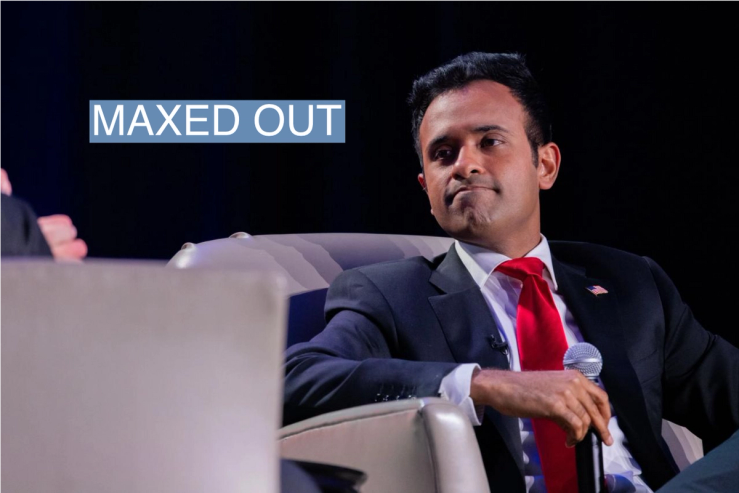The Scoop
If Vivek Ramaswamy wants to appear on Newsmax, he should pay to do it.
That was the message that network chief Chris Ruddy delivered to the Republican presidential candidate during a private call earlier this summer, according to two people to whom the candidate described the conversation. Ramaswamy had complained that the right-leaning network was sticking him in little-watched midday slots or ignoring him outright.
Ruddy also suggested a solution, Ramaswamy told associates: buy more television ads on the network. Ruddy, Ramaswamy told them, noted that such a transaction had helped Republican businessman Perry Johnson, a gadfly candidate who has thus far garnered only passing attention among mainstream and even conservative outlets covering the 2024 presidential cycle.
In a statement, Newsmax spokesperson Bill Daddi told Semafor that the insinuation “that Newsmax is asking candidates to advertise in order to ensure coverage as some quid pro quo … is categorically untrue and incorrect. Newsmax would take an assertion such as that very seriously. There is no correlation between advertising and editorial visibility for any candidate on Newsmax.”
“If candidates want to reach our audience outside of our programming, then, of course, advertising would be a good way for them to do this. That is the basis of all political advertising,” he said.
The spokesperson said that Newsmax was early to offer Ramaswamy airtime on the channel after he first announced, and that the network “consistently covered all of the major and minor candidates, a number of whom have spent nothing with the network, such as Mike Pence and Nikki Haley.”
“As is true for all networks, if candidates want to reach our audience outside of our programming, then, of course, advertising would be a good way for them to do this,” the spokesperson said. “That is the basis of all political advertising, whether it be on Newsmax, FNC, CNN or MSNBC.”
In a letter to Semafor after this article was published, a lawyer representing Newsmax, Mark Goidell, said Ruddy disputes the sources’ characterization of the call. Goidell said that since the telephone call, Ramaswamy had been invited to appear on Newsmax six times, but declined or canceled appearances four times, a point which the lawyer said was “wholly inconsistent with any demand or request for a quid pro quo.”
Ramaswamy declined to comment.
In this article:
Max’s view
Political advertising is big business for American media of all sorts during election years, and campaigns often suspect that their rivals are buying more than 30-second slots with big ad buys. And Ruddy and Newsmax are under mounting financial pressure as lawsuits from the voting technology companies Smartmatic and Dominion move toward trial.
On the closely scrutinized presidential level, any such suggestion is usually unspoken, and candidates rarely give voice to their suspicions for fear of angering powerful media owners.
But Ramaswamy’s account of his conversation comes with a persuasive data point. Ruddy’s comments, as reported by the candidate, raise the question of why else Newsmax would be devoting so much attention to Johnson, who is more closely tied to the network than anyone except Trump.
Johnson pays for political ads on Newsmax, appears as a candidate in occasional interviews on the network, and is the focus of multiple recurring documentary-style shows on the cable channel about his campaign.
Over the past several months, the Republican businessman has hosted Backstage Pass, a reality TV show airing on the network that chronicles his presidential campaign. And according to a page on his campaign website, he has also hosted Perry Johnson in Prime Time, which airs on Sunday nights.
Johnson has been the beneficiary of some positive news coverage on the network as well. While he has received little mainstream coverage, Newsmax has run headlines including “Perry Johnson to Newsmax: Campaign Message Resonates With Young Americans,” Will Michigan’s “Quality Guru” Johnson Be to the Debt What Ross Perot Was in ’92?” and “Perry Johnson Is 2nd to Trump, but Who Is He?” a reference to Johnson’s second place finish in a Turning Point Conference straw poll that found Trump at 86% support and Johnson with 8%.
Despite his appearances on the network, Johnson has not gotten traction in the primary polls. He says he has qualified for the first presidential debate earlier this month.
Conversely, Ramaswamy and his campaign feel that they were starting to see results from their relentless press tour: Media outlets were spending time covering Ramaswamy seriously, and his poll numbers have ticked up nationally and in the early primary and caucus states polls.
Notable
- Ben wrote in a 2020 New York Times piece that “Nobody I’ve ever covered treats an audience with the blithe disdain of Mr. Ruddy. He has them watching a great story — a thriller, a whodunit — about a stolen election. He thinks they’re stupid enough to fall for it, dumb enough to keep watching even after the fantasy inevitably dissolves, buying the supplements and the books and, crucially, tuning in to channel 1115 in large enough numbers that, eventually, the cable companies will pay him.”
- Around the world, the government is often the advertiser who demands loyalty in exchange for cash, as in Mexico, where a 2017 New York Times report described the governing PRI’s message to publishers as, “I do not pay you to criticize me.”
- One of the most visible uses of advertising to influence endorsements in the U.S. came in 2009, when billionaire Mike Bloomberg poured cash into advertising in small newspapers, which almost universally endorsed him.

